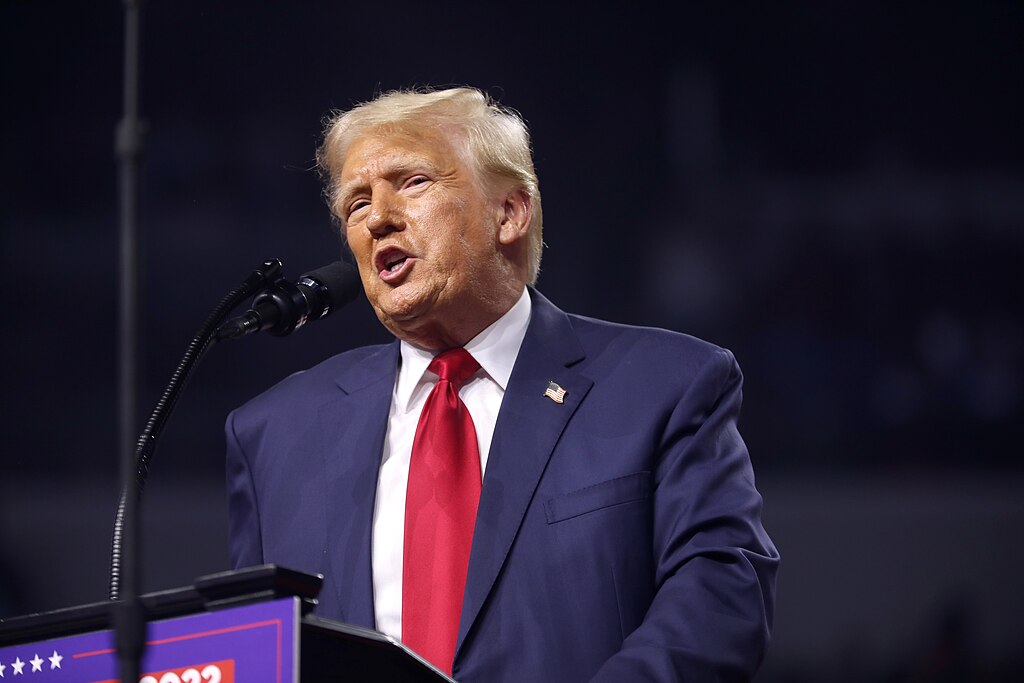Former President Donald Trump has promised a sweeping economic penalty on Mexico, vowing to implement tariffs of 25% to 75% on all Mexican imports if Mexico does not take immediate steps to curb the flow of immigration into the United States. Trump made the announcement during a recent campaign rally, positioning his proposed tariff policy as a direct measure to pressure Mexico into stricter border enforcement.
Trump’s call for high tariffs marks a return to his hardline immigration stance, which characterized much of his first term. “We’re done asking politely,” Trump said. “If Mexico doesn’t help stop this wave of illegal immigration, they will pay a price.” He argued that his administration would hold Mexico accountable for what he describes as a lack of cooperation on immigration control, with tariffs intended to force Mexico to tighten its own borders and prevent migrants from reaching the U.S.
The proposed tariffs, ranging from 25% to as high as 75%, would apply to all Mexican goods entering the U.S., impacting everything from automobiles and electronics to agricultural products. Economists warn that such drastic tariffs could strain the U.S.-Mexico trade relationship, one of the largest in the world, and could lead to higher prices for American consumers. Critics argue that the impact on American households would be substantial, with tariffs likely to drive up costs for goods that many U.S. industries and consumers rely on.
Trump’s proposed tariffs have stirred considerable controversy. Supporters view the plan as a strong stance on border security and a way to hold Mexico accountable. “This is exactly the kind of tough policy we need,” said Mark Reynolds, a Trump supporter at the rally. “If Mexico won’t help us secure our border, then we’ll hit them where it hurts—in their wallet.”
However, critics argue that the tariffs could backfire, damaging the U.S. economy and straining diplomatic relations with Mexico. Trade experts have cautioned that tariffs at such high levels could lead to retaliation from Mexico, which could impose its own tariffs on American exports. “This kind of trade war would hurt both countries,” said Dr. Maria Perez, a trade policy analyst. “Mexico is a key trading partner, and tariffs would harm U.S. businesses and consumers who depend on affordable imports.”
The threat of tariffs also underscores the tension between economic policy and immigration enforcement, as Trump’s plan would effectively use trade as leverage to address border security issues. Opponents say that Trump’s approach may be an attempt to appease his base, rather than a viable strategy for addressing the complexities of immigration.
Mexican officials have not publicly commented on Trump’s tariff proposal, though experts suggest the Mexican government is likely concerned about the potential economic fallout. With the U.S. presidential election on the horizon, the issue of immigration and U.S.-Mexico relations will undoubtedly remain a key focus for both Trump and his political opponents.
As the campaign trail heats up, Trump’s promise of hefty tariffs on Mexican goods has drawn a sharp line, making it clear that immigration will be at the forefront of his policy agenda. Whether this approach will resonate with voters or raise concerns over potential economic consequences remains to be seen.



 Trump Backs Nexstar–Tegna Merger Amid Shifting U.S. Media Landscape
Trump Backs Nexstar–Tegna Merger Amid Shifting U.S. Media Landscape  Pentagon Ends Military Education Programs With Harvard University
Pentagon Ends Military Education Programs With Harvard University  Trump Allegedly Sought Airport, Penn Station Renaming in Exchange for Hudson River Tunnel Funding
Trump Allegedly Sought Airport, Penn Station Renaming in Exchange for Hudson River Tunnel Funding  TrumpRx Website Launches to Offer Discounted Prescription Drugs for Cash-Paying Americans
TrumpRx Website Launches to Offer Discounted Prescription Drugs for Cash-Paying Americans  U.S.-India Trade Framework Signals Major Shift in Tariffs, Energy, and Supply Chains
U.S.-India Trade Framework Signals Major Shift in Tariffs, Energy, and Supply Chains  Trump Signs Executive Order Threatening 25% Tariffs on Countries Trading With Iran
Trump Signs Executive Order Threatening 25% Tariffs on Countries Trading With Iran  Trump Allows Commercial Fishing in Protected New England Waters
Trump Allows Commercial Fishing in Protected New England Waters  India–U.S. Interim Trade Pact Cuts Auto Tariffs but Leaves Tesla Out
India–U.S. Interim Trade Pact Cuts Auto Tariffs but Leaves Tesla Out  Nighttime Shelling Causes Serious Damage in Russia’s Belgorod Region Near Ukraine Border
Nighttime Shelling Causes Serious Damage in Russia’s Belgorod Region Near Ukraine Border  Iran–U.S. Nuclear Talks in Oman Face Major Hurdles Amid Rising Regional Tensions
Iran–U.S. Nuclear Talks in Oman Face Major Hurdles Amid Rising Regional Tensions  Trump Lifts 25% Tariff on Indian Goods in Strategic U.S.–India Trade and Energy Deal
Trump Lifts 25% Tariff on Indian Goods in Strategic U.S.–India Trade and Energy Deal  Ohio Man Indicted for Alleged Threat Against Vice President JD Vance, Faces Additional Federal Charges
Ohio Man Indicted for Alleged Threat Against Vice President JD Vance, Faces Additional Federal Charges  Missouri Judge Dismisses Lawsuit Challenging Starbucks’ Diversity and Inclusion Policies
Missouri Judge Dismisses Lawsuit Challenging Starbucks’ Diversity and Inclusion Policies  South Korea Assures U.S. on Trade Deal Commitments Amid Tariff Concerns
South Korea Assures U.S. on Trade Deal Commitments Amid Tariff Concerns  Trump Endorses Japan’s Sanae Takaichi Ahead of Crucial Election Amid Market and China Tensions
Trump Endorses Japan’s Sanae Takaichi Ahead of Crucial Election Amid Market and China Tensions  New York Legalizes Medical Aid in Dying for Terminally Ill Patients
New York Legalizes Medical Aid in Dying for Terminally Ill Patients  Trump Says “Very Good Talks” Underway on Russia-Ukraine War as Peace Efforts Continue
Trump Says “Very Good Talks” Underway on Russia-Ukraine War as Peace Efforts Continue 































